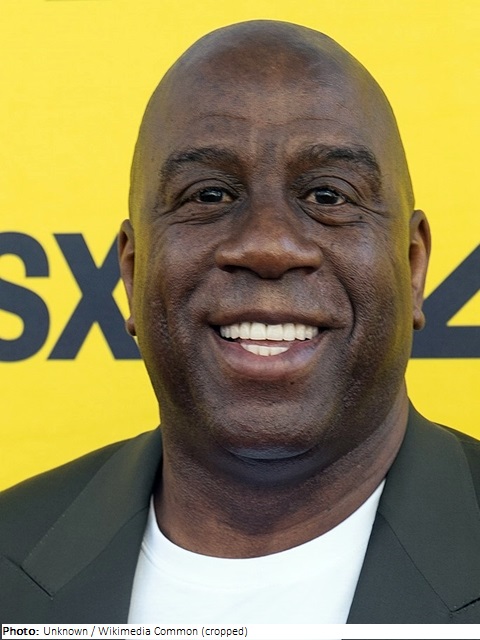Magic Johnson

Biographical information
| Roles | Competed in Olympic Games |
|---|---|
| Sex | Male |
| Full name | Earvin "Magic"•Johnson, Jr. |
| Used name | Magic•Johnson |
| Born | 14 August 1959 in Lansing, Michigan (USA) |
| Measurements | 205 cm / 100 kg |
| Affiliations | Los Angeles Lakers, Los Angeles (USA) |
| NOC |  United States United States |
| Medals | OG |
| Gold | 1 |
| Silver | 0 |
| Bronze | 0 |
| Total | 1 |
Biography
In terms of professional basketball, Magic Johnson is often included on any Mount Rushmore of the greatest players of all-time. Earvin “Magic” Johnson starred in college at Michigan State University and in 1979 led the Spartans to the NCAA title, defeating Indiana State, led by Larry Bird, in the final game. The game remains the most highly watched NCAA title game ever, and over the next 15 years, Magic and Bird’s names would become synonymous as they, along with Michael Jordan, resurrected NBA basketball, restoring popularity in the professional game.
Johnson was drafted in 1979 by the Los Angeles Lakers as the first overall pick, and he played in the NBA from 1979-91, but would later return for part of the 1996 season. During his time with the Lakers, he led them to five NBA titles (1980, 1982, 1985, 1987-88), being named finals MVP in 1980, 1982, and 1987. Most of those years, the Lakers battled the Boston Celtics, led by Bird, for supremacy.
Johnson was a 6-9 (2.05) point guard, the largest ever to play the position, but was known for his passing skills. However, in the 1980 NBA Final, center Kareem Abdul-Jabbar was out with an ankle injury in the sixth game. Magic moved over to the center position, proving he could play anywhere, and led the Lakers to the victory, which gave them the title.
Johnson won three NBA MVP awards (1987, 1989-90) and was a 12-time All-Star (1980, 1982-92). He was named All-NBA First Team for nine consecutive years (1983-91), and was second-team in 1982. He led the NBA in assists in 1983, 1984, 1986, and 1987, and in steals in 1981 and 1982. Johnson retired with career averages of 19.5 points/game, 7.2 rebounds/game, and 11.2 assists/game, the all-time NBA leader in assists.
In November 1991 Johnson held a press conference to announce that he had been diagnosed as HIV-positive and would retire from the NBA. At the time, the disease was held to be almost uniformly fatal, and this announcement came only a few months before a similar one by tennis superstar Arthur Ashe. Fortunately for Johnson, but not Ashe, his disease was not far advanced, and better treatments allowed him to live almost a normal life.
Johnson was chosen for the 1992 US Olympic Dream Team, which dominated the opposition to win the 1992 Olympic gold medal. There was some controversy in that, as at the time there was more concern about HIV viral transmission by contact on the sporting field, which proved to be unwarranted.
In 1994 Johnson returned to the Lakers as a coach, although he coached them for only part of that season and 16 games, and with little success. In 1996 Johnson returned and played part of that season with the Lakers, though his talents had diminished, both because of age, and his time away from the game. However, he formed the Magic Johnson All-Stars, a touring team, and also played a few games in 1999 with M7 Borås in Sweden.
After his retirement from basketball, Johnson became a businessman and entrepreneur, among the most successful African-American businessmen in the country. He also worked as a television analyst and a motivational speaker. In 2012 Johnson joined with a group of businessman to buy the Los Angeles Dodgers. He has had part ownership in the Dayton Dragons, a minor league baseball team; the Los Angeles Sparks, a WNBA team; and the Los Angeles FC, a Major League Soccer franchise. In February 2017 Johnson became President of Basketball Operations for the Lakers.
Results
| Games | Discipline (Sport) / Event | NOC / Team | Pos | Medal | As | |
|---|---|---|---|---|---|---|
| 1992 Summer Olympics | Basketball (Basketball) |  USA USA |
Magic Johnson | |||
| Basketball, Men (Olympic) | United States | 1 | Gold |
List mentions
- Listed in Olympians Who Won Olympic, NCAA and NBA Basketball Titles (Olympic Champion: 1992; NCAA Champion: 1979 Michigan State University; NBA Champion: 1980, 1982, 1985, 1987-88 Los Angeles Lakers)
- Listed in Olympians With a Net Worth > $100M ($600M (The Richest, 2019))
- Listed in Olympians Who Received the US Presidential Medal of Freedom (Awarded by President Joseph Biden in 2025.)